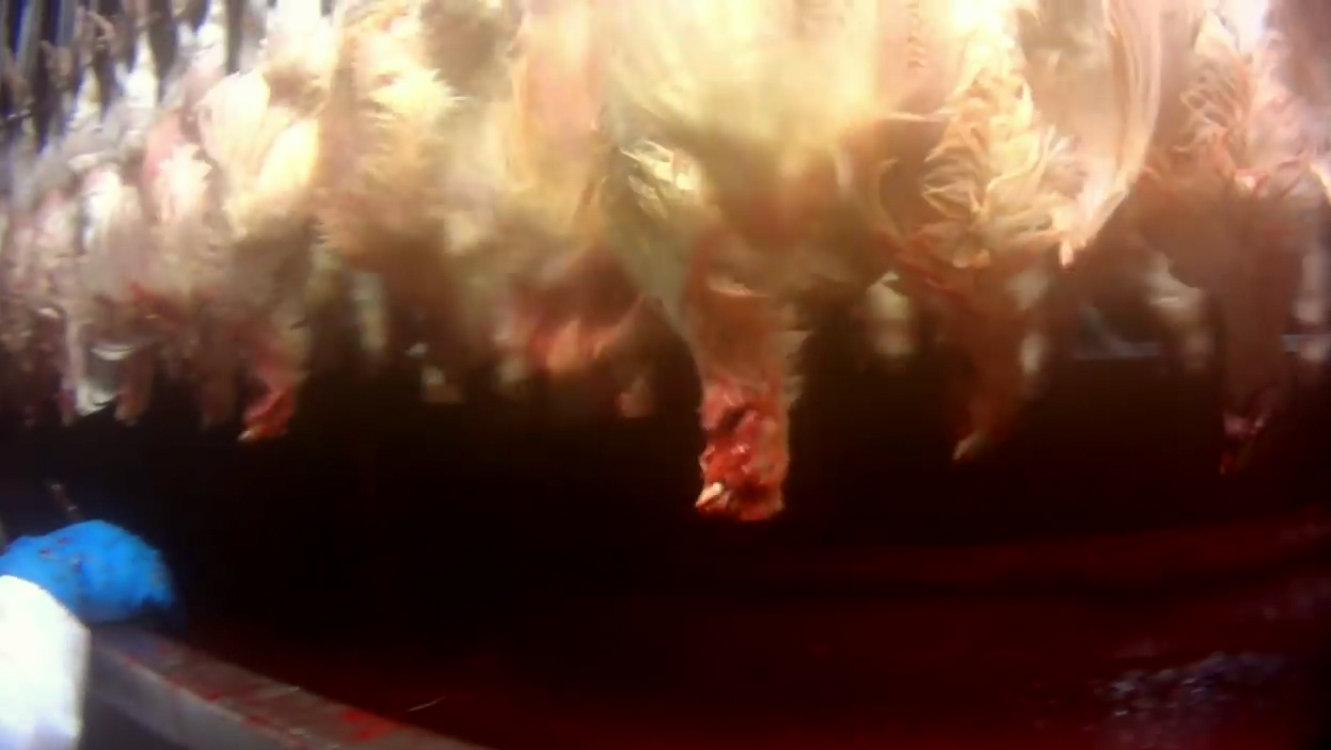
For the fourth time in less than a year, an anti-animal cruelty group has infiltrated a facility connected to mega-meat supplier Tyson Foods and secretly filmed graphic video showing what they contend is inhumane treatment of chickens grown by America’s biggest poultry producer.
The new video from the Los Angeles-based Mercy for Animals was filmed at a Tyson contract farm in Lewisburg, Tenn., and shows images of deformed birds, filthy conditions and sickly chickens that the group claims are bred so fast they are unable to carry their own weight.
http://https//youtu.be/BsrFtrC6UGk
“I think the industry is starting to learn that it’s going to cost more to continue to abuse animals as consumers learn about these cruel practices, and act accordingly in what they choose to purchase at stores and restaurants as well as in pushing elected representatives to increase the legal protections for animals,” Matt Rice, the director of investigations for Mercy, told USA TODAY.
The footage of the Lewisburg farm is the latest in a stepped up push by animal rights and social justice groups that are trying to pressure the poultry industry to make changes in how they treat workers and breed and process some of the 8 billion chickens that are consumed by Americans each year.
Earlier this month, the social justice group Oxfam America published a report alleging that workers at Tyson Foods, Pilgrim’s Pride, Perdue, and Sanderson Farms routinely deny bathroom breaks to workers at the largest American poultry producers’ processing plants, leading some workers to even wear diapers on the line.
Three of the companies—Tyson’s, Pilgrim’s Pride, and Perdue—said they were reviewing the allegations from anonymous workers cited in the Oxfam report but had yet to turn up any evidence confirming that they are true.
Last month, two West Virginia chicken farmers who are contracted with Pilgrim’s Pride spoke out in a video produced by the group Compassion in World Farming, questioning whether demands placed on contract farmers by the nation’s biggest poultry companies is leading to birds being raised in gruesome conditions.
In the new video released on Tuesday by Mercy for Animals, sickly birds covered in fecal matter, a dying bird covered in insects, and a front-end loader scooping up hundreds of dead birds and dropping them into a dumpster. The video was filmed by a Mercy investigator who was able to get a job at the Lewisburg farm from March 26 to May 10.
Worth Sparkman, a spokesman for Tyson, told USA TODAY that company veterinarians and animal health experts were looking into the new allegations by Mercy.
“If our investigation into this farm uncovers anything wrong, we will immediately address it,” Sparkman said. “The health and well-being of the birds raised for us by independent farmers is extremely important, which is why we employ veterinarians and coordinate third-party animal well-being audits of the farms that supply us.”
The farm’s operator did not respond to a request for comment.
In the last year, the group has paid particular attention to Tyson Foods.
In October, Tyson fired at least two employees who worked at its Carthage, Miss. processing facility after Mercy released secretly-recorded video that showed the company’s slaughterhouse workers punching, throwing and pulling the heads off live broiler chickens.
Two contract farmers in Tennessee pleaded guilty to misdemeanor animal cruelty after Mercy published video in August that showed the operators clubbing small and sickly chickens to death. The farm produced chicken for Tyson that was sold to McDonald’s. Tyson’s cut ties with the farmers as McDonald’s decried the activity in the video as unacceptable.
The group also managed to film undercover video in July of a Delaware facility, which they say supports their view that the company’s breeding practices lead to it contract farmers growing birds that live brief, torturous lives.
Sparkman, the Tyson spokesman, said that the company has attempted to meet with Mercy to discuss its concerns.
“We previously offered to meet with them but they declined,” Sparkman said. “They were more interested in promoting their organization than having a meaningful discussion.”
Rice, the Mercy director of investigations, said that the company told the group’s leadership after its Delaware investigation that they would meet with them, but only after they removed their video from the group’s web site. That was a non-starter for Mercy, Rice said.
Charlie Arnot, the CEO of the Center for Food Integrity, a non-profit organization whose members include several major food industry companies, said that his organization has empaneled academics to review the videos by groups like MFA.
The reviews have shown in some cases that some or parts of the misconduct alleged by the anti-cruelty groups has merit. But the videos, Arnot said, are always without complete context.
Arnot said that the videos may be having impact on attitudes. The CFI’s research shows that the larger the entity is the more likely the public is to believe that the company will put profit before public interest.
But the activists may not be impacting the companies’ bottom lines, according to the industry group.
“It is impacting consumers’ attitudes about productions and practices,” Arnot said. “It doesn’t appear to be having any impact on purchasing decisions.”

